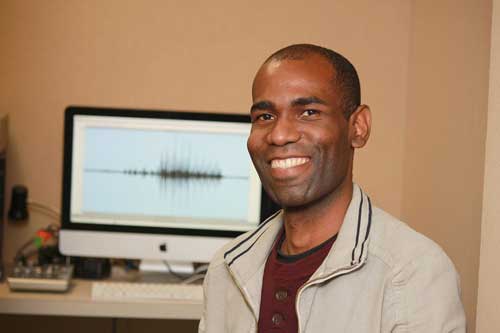Dr. Drew Rendall's psychology lab might be considered atypical in its student makeup now, but as the University of Lethbridge continues to push internationalization as a key strategic goal, it may soon become representative of many.
Rendall currently has graduate students from Alberta, Manitoba, Sri Lanka and Brazil assisting with his research projects, the most recent addition coming to the University by way of the Brazilian Science Without Borders (SWB) program.
"This is a real boon for us as a university," says Rendall, professor of psychology in the Faculty of Arts & Science. "Graduate students are kind of the heart of the research enterprise, they are the real engine of it. They collect the data and do a lot of the work, and without graduate students the research enterprise disappears."
Science Without Borders began as an initiative whereby the Brazilian government is looking to send 100,000 students to universities around the world to study in the fields of science, technology, engineering and mathematics. The goal is to revolutionize the country's research and development system.
"Brazilian science has shown great improvement over the last decade but we face many challenges," says Ednei Barros dos Santos, a Brazilian PhD student who has taken advantage of the SWB program to come study under Rendall at the U of L.
"We have a very low proportion of doctors in relation to our population, and there is a low frequency of international collaboration."

Dos Santos discovered Rendall while researching his master's degree in zoology. After reading his papers, he decided to contact Rendall to see if he was open to supervising his PhD studies. The two met while Rendall was on field study in Argentina and not long after, dos Santos applied to the SWB program for funding.
"My research focus is on song variations of the house wren. I'm going to compare the male songs of two different populations, one here in Canada and the other in Argentina," says dos Santos. "We are trying to understand what is the relation between song variation and different mating systems and migratory behaviour."
That his master's work in Brazil, where he researched language in animal species, could be so closely related to Rendall's studies some 11,000 kilometres away, speaks to the value of international collaboration.
"This program provides an incredible opportunity for Brazilian students to be exposed to scientific innovation at Canadian universities, and will help to spur growth in science and technology sectors in Brazil," says Trish Jackson, the U of L's acting manager, International Centre for Students. "The students we are hosting are a wonderful addition to the institution; they have serious academic intentions, and will certainly make an impact when they return to complete their studies in Brazil."
The SWB program initially provided study opportunities for undergraduate students, placing more than 1,200 in Canadian universities alone. The U of L has 14 students enrolled from the program, including three who began last September and 11 more since January. Currently, a second call is going out for prospective doctoral students, and it is incumbent that faculty members provide the program with details of their research opportunities so that they might be able to participate. The PhD program is one of eight graduate programs offered by the School of Graduate Studies.
"We're excited to take part in this program. It's proven to be very successful at the undergraduate level and is likely to draw exceptionally high quality students," says Dr. Matthew Letts, Associate Dean of the Faculty of Arts & Science. "The program provides full support for PhD students from Brazil, including tuition, travel, book and living expenses, but potential supervisors need to enter the doctoral research opportunities they wish to provide into the CBIE (Canadian Bureau for International Education) Placement Database to be considered for participation."
That dos Santos was accepted by SWB is heartening to Rendall, given that his research is not as applicable as many of the funded students.
"Brazil is very interested in training students who can come back and contribute fairly directly to agricultural initiatives, to resource extraction initiatives and to the information systems industry, for example," says Rendall. "The thrust of what Ednei is working on doesn't have immediate and obvious implications but I think it's pretty encouraging that they are taking a fairly broad approach to this. It shows that they are also interested in training some basic scientists who will come back and contribute to science broadly, and that's exciting."
For more information on the program, contact Dr. Matthew Letts (matthew.letts@uleth.ca) or Dr. Helen Kelley (helen.kelley@uleth.ca)
GET THE FACTS
· Science Without Borders was just one of the initiatives discussed when University President Mike Mahon visited Brazil in May as one of 30 Canadian university presidents who took part in an educational tour
· Dos Santos is wrapping up a three-month field study of house wrens in Argentina and will be back studying at the U of L in February
· The second call for SWB doctoral students runs from Feb. 1 to May 31 for January 2014 intake. The third call runs from June 1 to Sept. 30 for May 2014 intake
· Researchers can access the SWB database at the following web address: web.cbie.ca/smi/index_e.html
